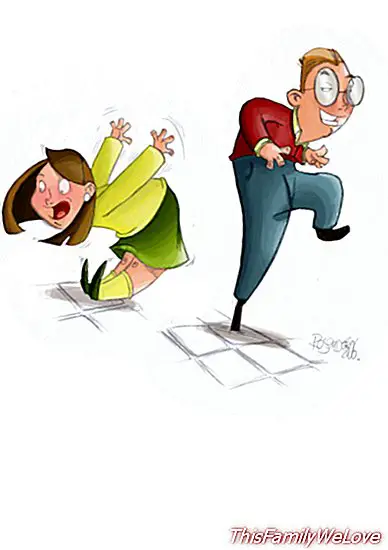8 children's games with which you learn
The game is not just a form of entertainment. For a child, playing is vital. In fact, it is fundamental for its proper development. The more he plays, the more experiences he accumulates and the more skills he acquires. Children need to play, it's their natural activity; through the children's games with which you learn they put into practice all those skills that favor their maturation.
The intellectual development that the children arrive depends a lot on the degree of stimulation they have received during their first years. Children, up to the age of six, have an enormous capacity to learn. In these years, the intellectual development is closely linked to its cerebral maturation. For this reason, there are children who learn before others to draw, write or read, as they are more or less mature in their neural organization, and have more or less motor skills (run, crawl, jump).
It is clear that, with an abundant and adequate stimulation, through games with which you learn, development is faster and is better cemented, but it is not about forcing the natural rhythm of maturation, but about stimulating and reinforcing it. For wanting to advance a lot in teaching the little one, it does not mature before.
Games with which you learn
Through the games, the children put into practice all those skills that favor their maturation. For them, the most fun game is learning. And a thousand situations can be exploited. For example, taking advantage of weekends and holidays, the child can develop his motor skills through exercises, games that involve putting into practice motor skills, such as tricycles, bicycles, skates, ping-pong ...
The child feels a crazy desire to play. Playing is for him opening up to a different world that brings him different knowledge, experiences, feelings and, of course, continuous values.
With a little foresight, we can think of different games. In this way, this activity does not remain a mere entertainment, but through it we seek to reaffirm your imagination, memory, obedience ... spending an entertaining time.
Be careful, because today's children only play "with" things and are not used to playing "a" things. On the other hand, many current diversions condition him in a certain way to a passive activity (videogames, movies, television ...).
8 children's games to learn by playing things
1. Flags game

In this exercise, children will freely roam the room or garden when they listen to music; when they do not hear it, they will remain quiet on the spot, making flags that move with the wind. When they listen to the music again, they will walk again, and so on. To vary the game, you can choose other objects: falling leaves, trees, etc.
2. Frogs and giants
We will propose that they walk like frogs, with which they will start to squat. Later, we will tell you that they are giants and they will walk on tiptoe stretching as much as possible and raising their arms as if they wanted to touch the ceiling. When they have captured it, with each slap we give, they will have to change their character or whenever they hear the word "frog" they will have to squat until they hear "giant".
3. Who is in charge?
In this game, in pairs, there has to be one that sends and decides how you want to go, what you want to do ... Your partner will have to do the opposite. If the leader is walking with his feet in, his partner should do it with his feet facing outwards. Dad, mom or an older brother can say in the ear of the boss what he has to do.
4. As balancers

We will tell the children that they are circus tightrope walkers and that they have to walk the tightrope. You can serve a rope on the floor, or the lines of the tiles. They will go on tiptoe, with their arms extended horizontally, always treading the same line and trying not to get out. If you find it easy, you can also try it with your eyes closed.
5. By the tiles

When we go down the street, or also at home, we can take advantage of the tiles on the tiles to suggest that children walk on tiptoe without stepping on any of the stripes. We can make a competition among the children to see who gets to walk more time without stepping on any line. Although you can also play on the contrary, stepping on the stripes putting your foot in the same direction as them.
6. Good observers
We will put all the children sitting in a circle. Each one must look carefully at an object or garment worn by another child, while we count to ten. Then one by one he will say what he has seen, and describe it as exactly as possible.
7. We are sculptors
We will do this exercise in pairs. Of the two, one will be the sculptor and the other a piece of clay.We must make it clear that clay does not do anything, it just lets itself be done. He who plays as a sculptor will place his partner as he likes, as if it were a sculpture, in different ways. Then, each child can explain what they have tried to do with their sculpture.
8. A circus

Now let's turn the house into a circus for a while. We will suggest to the little ones that they become circus horses, telling them to gallop (raising their knees) in a circle, one after the other. We will act as tamers and we will tell you: "faster", "slow down", "stop", etc. We can also make them gallop in pairs, one next to the other, or caught by a stick.
What develops the game in children?
The game is an activity that develops many skills:
1. Physical abilities:
- physical development
- ability to move
- senses
2. Intellectual skills:
- knowledge and skills
- spontaneity
- imagination
- creativity
- mental agility
- memory
- Attention
- observation
3. Emotional skills:
- sensitization
- sociability
- conditions and hobbies
- forge the will
Beatriz Bengoechea.Psychologist and family counselor
Illustrations: Pablo Álvarez Rosendo




